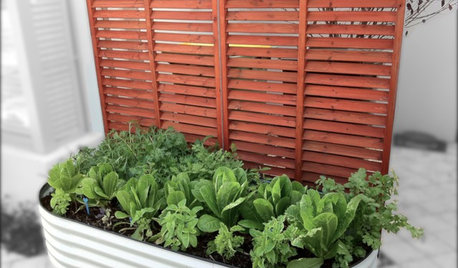To Rot or Not To Rot - That is the Question
equinoxequinox
10 years ago
Related Stories

GARDENING AND LANDSCAPING8 Rot-Resistant Woods for Your Outdoor Projects
No need for chemical treatments on your deck or pergola. These woods stand up to weather, insects and time beautifully on their own
Full Story
REMODELING GUIDESConsidering a Fixer-Upper? 15 Questions to Ask First
Learn about the hidden costs and treasures of older homes to avoid budget surprises and accidentally tossing valuable features
Full Story
MOVINGHiring a Home Inspector? Ask These 10 Questions
How to make sure the pro who performs your home inspection is properly qualified and insured, so you can protect your big investment
Full Story
CURB APPEAL7 Questions to Help You Pick the Right Front-Yard Fence
Get over the hurdle of choosing a fence design by considering your needs, your home’s architecture and more
Full Story
EXTERIORSCurb Appeal Feeling a Little Off? Some Questions to Consider
Color, scale, proportion, trim ... 14 things to think about if your exterior is bugging you
Full Story
HOUZZ TOURSHouzz Tour: Making a Comeback in the Hollywood Hills
Get a front-row seat to see how this 1912 home went from rotting and crumbling to bright and picture perfect
Full Story
CURB APPEALA New Stepped Entry Glows With Style
Rotting stairs and leaky windows lead to an inviting new facade that welcomes with light
Full Story
HOUSEKEEPINGOutdoor Home Prep to Do Before Hard Winter Hits
Avoid cracking, rusting and rotting during freezes by taking care of these tasks now
Full Story
FEEL-GOOD HOME21 Ways to Waste Less at Home
Whether it's herbs rotting in the fridge or clothes that never get worn, most of us waste too much. Here are ways to make a change
Full Story
TILETop Tile Trends From the Coverings 2013 Show — the Wood Look
Get the beauty of wood while waving off potential splinters, rotting and long searches, thanks to eye-fooling ceramic and porcelain tiles
Full StorySponsored
More Discussions






hummersteve
mendopete
Related Professionals
Allentown Landscape Contractors · Arlington Landscape Contractors · Brookline Landscape Contractors · Gainesville Landscape Contractors · Paramount Landscape Contractors · Westford Landscape Contractors · New Bern General Contractors · Belleville General Contractors · Fort Pierce General Contractors · Janesville General Contractors · San Elizario General Contractors · Spanaway General Contractors · Vermillion General Contractors · Waterville General Contractors · Winton General Contractorssbryce_gw
chuckiebtoo
11otis
Boukmn
Boukmn
sbryce_gw
barbararose21101
chuckiebtoo
equinoxequinoxOriginal Author
sbryce_gw
equinoxequinoxOriginal Author
11otis
mendopete
sbryce_gw
equinoxequinoxOriginal Author